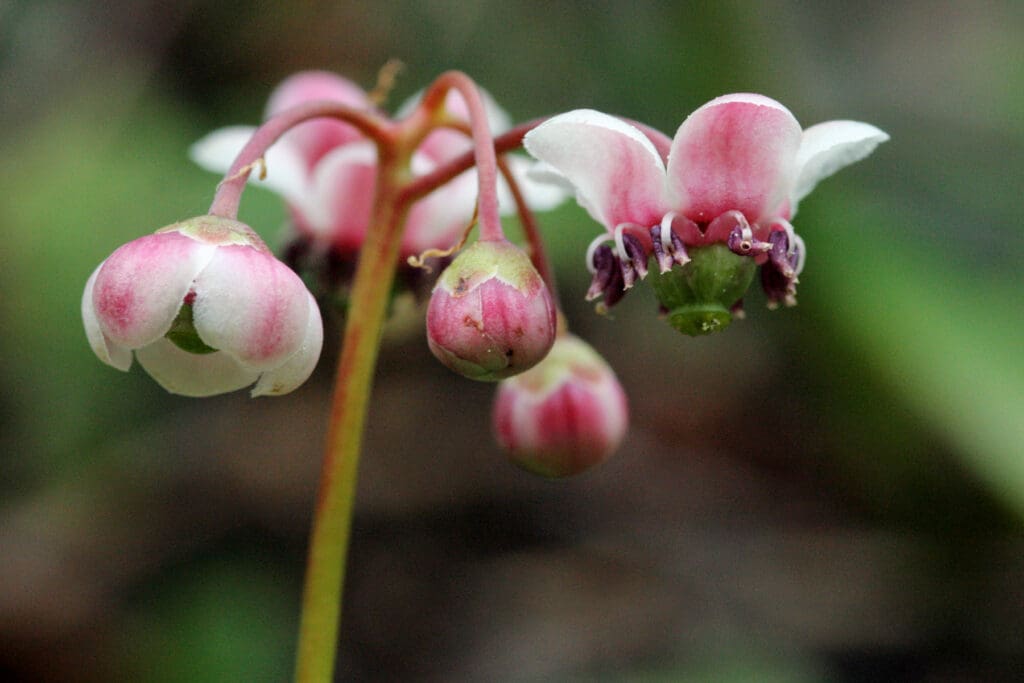Pipsissewa, scientifically known as Chimaphila umbellata, is a perennial herb belonging to the Ericaceae family. Historically used in traditional medicine, particularly among Native American tribes, Pipsissewa has garnered attention for its potential nootropic benefits. This article explores the chemistry, physiological mechanisms, potential cognitive enhancements, dosing guidelines, side effects, drug interactions, and critical considerations surrounding Pipsissewa as a nootropic supplement.
You May Also Like:
Chia Seeds: Benefits, Dosage, Side Effects, Drug Interactions, and Other Important Information
Trypsin: Benefits, Dosage, Side Effects, Drug Interactions, and Other Important Information
Sources of Pipsissewa
Pipsissewa is native to North America, thriving in moist, shaded woodlands. The plant features evergreen leaves and small, white or pink bell-shaped flowers, making it distinctive in its natural habitat. Traditional uses of Pipsissewa include addressing urinary tract infections, kidney stones, and respiratory issues. However, its emerging role as a nootropic has attracted significant interest.
Pipsissewa can be consumed in various forms, including:
- Dried Leaves: Often used for teas or herbal extracts.
- Tinctures: Concentrated liquid extracts derived from the plant.
- Capsules: Powdered forms for convenient supplementation.
- Liquid Extracts: Potent formulations for easy consumption.
While these forms allow for versatile intake, the efficacy and bioavailability of each can vary significantly.
Support Body Wellness and Brain Function with Pipsissewa—Order Now on Amazon!

Chemistry of Pipsissewa
The primary bioactive compounds in Pipsissewa include flavonoids, tannins, and triterpenes. These phytochemicals contribute to the plant’s medicinal properties and may play crucial roles in its nootropic effects.
- Flavonoids: Pipsissewa is rich in flavonoids, particularly quercetin and kaempferol. These compounds exhibit strong antioxidant properties, combating oxidative stress and promoting neural health.
- Tannins: Known for their astringent properties, tannins in Pipsissewa may influence digestive health and contribute to its anti-inflammatory effects.
- Triterpenes: These compounds have been studied for their potential neuroprotective effects, suggesting a possible role in cognitive enhancement.
These active ingredients demonstrate a complex interplay that may support cognitive function, enhance mood, and provide neuroprotective benefits.
Physiological Mechanisms of Pipsissewa in the Body and Brain
Pipsissewa’s potential nootropic benefits can be attributed to its multifaceted biochemical actions. The key physiological mechanisms include:
- Antioxidant Activity: The flavonoids present in Pipsissewa help neutralize free radicals, reducing oxidative stress in the brain. Oxidative damage is a known contributor to cognitive decline and neurodegenerative diseases, making antioxidants crucial for brain health.
- Anti-inflammatory Effects: Chronic inflammation is linked to various neurological conditions, including Alzheimer’s disease. The anti-inflammatory properties of Pipsissewa may protect neural tissues, reducing the risk of inflammation-induced cognitive impairment.
- Neurotransmitter Modulation: Some studies suggest that Pipsissewa may influence neurotransmitter systems in the brain, particularly by enhancing levels of serotonin and dopamine. These neurotransmitters are essential for mood regulation and cognitive function, supporting the idea that Pipsissewa could serve as a mood enhancer and cognitive booster.
- Neuroprotection: Triterpenes and flavonoids in Pipsissewa may provide neuroprotective effects, helping to maintain neuronal integrity and function. This aspect is particularly relevant for individuals at risk of cognitive decline due to aging or neurodegenerative diseases.
By targeting oxidative stress, inflammation, and neurotransmitter systems, Pipsissewa may contribute to overall cognitive health and performance.
Pipsissewa for Complete Body and Brain Wellness—Shop Amazon’s Best Supplements Now!

Nootropic Benefits of Pipsissewa
The potential nootropic benefits of Pipsissewa have been a focal point for researchers and health enthusiasts alike. Key benefits may include:
- Enhanced Cognitive Function: The antioxidant properties of Pipsissewa may improve cognitive performance by protecting the brain from oxidative damage. By reducing oxidative stress, the plant may help maintain memory, attention, and overall cognitive agility.
- Mood Enhancement: By potentially modulating neurotransmitter levels, particularly serotonin and dopamine, Pipsissewa may improve mood and emotional well-being. This effect could lead to enhanced motivation, focus, and cognitive performance.
- Neuroprotection: The neuroprotective properties of Pipsissewa may help shield the brain from age-related decline. This aspect is vital for older adults or those with risk factors for cognitive impairment.
- Stress Reduction: The anti-inflammatory effects of Pipsissewa may help mitigate the physiological impacts of stress. Chronic stress could lead to cognitive decline, and the ability to manage stress effectively can have far-reaching effects on cognitive performance.
- Improved Focus and Concentration: Pipsissewa may enhance focus and concentration by supporting neurotransmitter balance and promoting optimal blood flow to the brain. This can be particularly beneficial during tasks requiring sustained attention or mental effort.
- Cognitive Resilience: Regular use of Pipsissewa may foster cognitive resilience, helping the brain adapt to challenging situations and recover from cognitive fatigue. This can enhance overall mental stamina and productivity.
- Enhanced Learning Abilities: Pipsissewa may support memory retention and learning capabilities by promoting synaptic plasticity, the brain’s ability to adapt and form new connections. This could facilitate quicker information processing and improved retention.
- Potential Anxiety Relief: By modulating neurotransmitter levels and reducing inflammation, Pipsissewa may help alleviate symptoms of anxiety. This calming effect may lead to improved mental clarity and decision-making under pressure.

Dosage and Supplementation Guidelines
Determining the appropriate dosage of Pipsissewa is critical for maximizing its potential benefits while minimizing risks. While specific research on Pipsissewa dosage is limited, general guidelines can be inferred from traditional use and related studies.
- General Dosage Recommendations: Typical dosages for Pipsissewa range from 300 to 600 mg per day, often divided into two or three doses. This range is generally safe and may offer cognitive benefits.
- Standardized Extracts: If using a standardized extract, follow the manufacturer’s guidelines for dosing. Standardized extracts ensure a consistent concentration of active compounds, providing a reliable dosing framework.
- Forms of Supplementation: Pipsissewa can be consumed in various forms, such as capsules, tinctures, or teas. When opting for herbal teas, steep the dried leaves for at least 10-15 minutes to extract the active compounds effectively.
- Consultation with Healthcare Providers: As with any supplement, it is essential to consult a healthcare professional before starting Pipsissewa, especially for those with existing health conditions or who are taking medications.
Support Whole-Body Health and Cognitive Clarity with Pipsissewa—Order Now from Amazon!

Side Effects and Safety
Pipsissewa is generally considered safe for most individuals, but potential side effects and safety considerations should be acknowledged:
- Gastrointestinal Disturbances: Some individuals may experience mild digestive issues, including nausea, diarrhea, or abdominal discomfort when consuming Pipsissewa. These effects are usually transient and resolve with continued use or reduced dosage.
- Allergic Reactions: Though rare, allergic reactions to Pipsissewa can occur, resulting in symptoms such as skin rashes, itching, or swelling. Individuals with known sensitivities to plants in the Ericaceae family should exercise caution.
- Urinary Effects: Pipsissewa has diuretic properties, which may increase urine production. While this can be beneficial for urinary tract health, it may lead to dehydration if fluid intake is insufficient.
- Pregnancy and Breastfeeding: Limited research is available on the safety of Pipsissewa during pregnancy and breastfeeding. Pregnant or nursing women should avoid supplementation unless advised by a healthcare provider.
- Potential for Drug Interactions: Pipsissewa may interact with certain medications, particularly those affecting liver enzymes or diuretics. It is crucial to discuss supplementation with a healthcare provider to avoid adverse interactions.
Interactions with Other Supplements and Medications
Understanding the potential interactions between Pipsissewa and other supplements or medications is vital for safe use:
- Anticoagulants: Pipsissewa may have mild blood-thinning effects, potentially enhancing the effects of anticoagulant medications such as warfarin. Individuals taking these medications should consult a healthcare provider before using Pipsissewa.
- Diuretics: Given its diuretic properties, Pipsissewa may amplify the effects of diuretic medications, leading to excessive fluid loss and electrolyte imbalances. Caution is advised when combining these substances.
- Liver Metabolizing Drugs: Pipsissewa may influence the metabolism of certain medications processed through the liver. Medications such as statins, anticonvulsants, or some antidepressants could be affected. Monitoring and possible dosage adjustments may be necessary.
- Other Nootropics: Pipsissewa may synergize with other nootropics, such as rhodiola rosea or ginkgo biloba, enhancing cognitive performance through complementary mechanisms. However, individuals should monitor their reactions and consult a healthcare professional to tailor combinations effectively.
Risks for Individuals with Certain Health Conditions
While Pipsissewa is safe for most people, certain health conditions may require caution:
- Kidney Disease: Individuals with kidney issues should avoid high doses of Pipsissewa due to its diuretic effects. Impaired kidney function could lead to further complications, including electrolyte imbalances.
- Liver Disease: Given Pipsissewa’s influence on liver metabolism, those with liver disease should approach supplementation with caution, ensuring that any use is monitored by a healthcare provider.
- Autoimmune Conditions: Pipsissewa’s immune-modulating properties may exacerbate symptoms in individuals with autoimmune diseases. Consulting with a healthcare professional before starting Pipsissewa is advisable for this population.
Promote Body Health and Mental Wellness with Pipsissewa—Order Today on Amazon!

Should You Consider Pipsissewa as a Nootropic?
Pipsissewa presents a compelling case for its potential as a nootropic supplement. Its rich profile of flavonoids, tannins, and triterpenes offers promising benefits for cognitive function, mood enhancement, and neuroprotection. While the current research is limited, the existing evidence supports its use in promoting brain health and mitigating cognitive decline.
Individuals seeking to enhance mental clarity, manage stress, or support emotional well-being may find value in Pipsissewa supplementation. However, due to the limited studies and potential interactions with medications or health conditions, it is crucial to consult with a healthcare professional before beginning supplementation.
In summary, Pipsissewa holds promise as a nootropic supplement, and with proper dosage, safety considerations, and potential interactions addressed, it may serve as a valuable addition to a holistic approach to cognitive wellness.

References:
- Antifungal and antioxidant activities of the phytomedicine pipsissewa, Chimaphila umbellata. Retrieved from: https://www.sciencedirect.com/science/article/abs/pii/S003194220700564X
- Study of the influence of the extract of pipsissewa on cell cultures. Retrieved from: https://journals.uran.ua/sr_pharm/article/view/307291
- Herbs in Epilepsy: Evidence for Efficacy, Toxicity, and Interactions. Retrieved from: https://www.sciencedirect.com/science/article/abs/pii/S1071909111000544
Important Note: The information contained in this article is for general informational purposes only, and should not be construed as health or medical advice, nor is it intended to diagnose, prevent, treat, or cure any disease or health condition. Before embarking on any diet, fitness regimen, or program of nutritional supplementation, it is advisable to consult your healthcare professional in order to determine its safety and probable efficacy in terms of your individual state of health.
Regarding Nutritional Supplements Or Other Non-Prescription Health Products: If any nutritional supplements or other non-prescription health products are mentioned in the foregoing article, any claims or statements made about them have not been evaluated by the U.S. Food and Drug Administration, and such nutritional supplements or other health products are not intended to diagnose, treat, cure, or prevent any disease.


